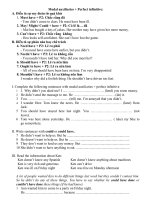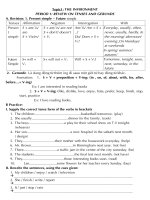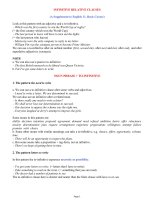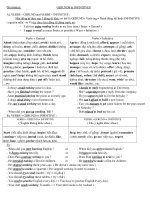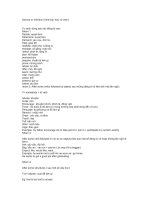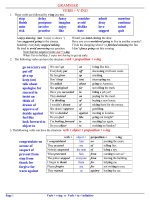GERUNDS & INFINITIVE
Bạn đang xem bản rút gọn của tài liệu. Xem và tải ngay bản đầy đủ của tài liệu tại đây (95.16 KB, 4 trang )
Grammar: GERUNDS & INFINITIVES
A). VERBS + GERUND and VERBS + INFINITIVE :
M ột động từ theo sau 1 động từ khác có thể là GERUND ( Verb-ing = Danh động từ) hoặc INFINITIVE
( nguyên mẫu -to V) tùy theo loại động từ đứng trước nó:
- I always enjoy reading books in my free time.( Enjoy + Gerund )
- I want to read as many books as possible.( Want + Infinitive )
Verbs + Gerund
Admit (thừa nhận,công nhận), avoid ( tránh,né),
delay( trì hoãn), deny( chối), detest, dislike( không
thích,không ưa), consider( xem xét,cứu
xét),enjoy( thưởng thức, hưởng), finish( hoàn
tất,làm xong), give up (=quit: từ bỏ, thôi),
imagine( tưởng tượng), keep( giữ), not mind
( không phiền), postpone ( hoãn lại, đình lại),
practise ( thực hành), quit( bỏ, từ bỏ), suggest( đề
nghò), can’t help( không thể ngăn cản), can’t stand
(không thể chòu đựng được), put off ( hoãn lại),
….etc.
Verbs + Infinitive
Agree ( đồng ý,nhất trí), afford, appear ( xuất hiện),
arrange( sắp xếp,thu xếp), attempt( cố gắng), ask
( đòi hỏi,yêu cầu), choose ( chọn, lựa), decide ( quyết
đònh), demand ( ra lệnh), expect ( mong,trông
ngóng), fail ( hỏng,không thành công,(thi) rớt),
happen (xảy ra) , hope ( hy vọng), learn ( hay tin),
manage ( xoay sở, tự lo được), offer ( dâng ,tặng),
plan ( kế hoạch, dự tính), pretend ( giả vờ), promise
(hứa hẹn), refuse ( từ chối), seem ( có vẻ như,
dường như), threaten ( đe dọa), want, wish ( ao ước),
would like ( muốn),…etc.
-I always avoid making noise in class. - I decide to study engineering at University.
-Have you finished writing the report ? - She’s expecting to get a reply from the company.
-Anne practised playing the piano at an early age. - Do you agree to join us for the holyday ?
- I don’t mind doing a lot of homework. - We can’t afford to build a new house.
- He can’t stand working ten hours a day. - Can you manage to get some tickets for the pop concert
on Saturday ?
- When did you give up smoking, Bill ? - Bob refused to lend me his car.
B). VERBS + GERUND or INFINITIVE :
VERBS + GERUND or INFINITIVE
( Ýùnghóa không khác nhau )
VERBS + GERUND or INFINITIVE
( Cho ý nghóa khác nhau )
Start ( bắt đầu, khởi động), begin ( bắt đầu),
continue ( tiếp tục),intend ( tính, dự đònh), like,
love, hate ( ghét), prefer (thích hơn,ưa hơn).
Stop, try ( thử, cố gắng) , forget (quên), remember
( nhớ), need ( cần), go on ( tiếp tục), regret.
Ex :
- When did you start learning English ? or - When did you start to learn English ?
- It began raining heavily. or - It began to rain heavily.
- Does Pam continue writing to you ? or - Does Pam continue to write to you ?
- He intended making a film for children. or - He intended to make a film for children.
- He stopped smoking three years ago. ( He doesn’t smoke any more now.)
- He stopped to smoke a cigarette. ( He stopped working in order to smoke ).
- You should try to study harder. ( try = cố gắng )
- You should try taking these tablets, ( try = thử )
- You need to practise English every day.( = You have to practise English every day).
- Your shirt needs washing .It smells. ( = Your shirt needs to be washed ).
C). VERB+PREPOSITIONS + GERUND : Động từ theo sau giới từ thường dùng ở dạng Gerund.
Ex :
- I’m interested in listening to music on the radio.
- He’s bored with staying at home day after day.
- Some people are afraid of driving in rush hours.
- Many overweight people try to lose weight by going on a diet.
- Don’t forget to turn off the gas before going out.
D) ADJECTIVE + TO infinitive:
Ex:
- I’m afraid to drive alone at night. - Were you disappointed not to win the race ?
- The actress seems eager to go on stage. - The parents are proud to have a healthy child.
- Citizens ought to feel lucky to be able to vote.- He was not at all surprised to hear the news.
- I’m looking for someone qualified to type a thesis. -
E) ADJECTIVE + PREPOSITION + GERUND: Các tính từ đi kèm giới từ được theo sau bởi Gerund.
Ex :
- Police soon get accustomed to arresting criminals.
- Are you capable of completing the work within an hour ?
- Eli Whitney is famous for inventing the cotton gin.
- The driver was intent on passing the other car.
- The treasurer is responsible for keeping the books.
***** o0o *****
Approve of ( chấp thuận, tán đồng), argue about ( tranh cãi về…), complain about ( than phiền, phàn
nàn về…), concentrate on ( tập trung vào…), depend on ( tùy thuộc vào…), decide on ( quyết đònh về…),
feel like ( cảm thấy thích, thiên về…), forget about ( quên về…). Look forward to ( trông mong,
ngóng…), insist on ( nài nỉ…), keep on ( cứ tiếp tục…), object to ( phản đối về…), plan on ( dự tính về…),
rely on ( tin vào, dựa vào…), succeed in ( thành công trong việc…), think about ( nghó về…), worry
about ( lo nghó về…, lo lắng về…).
Approve of ( chấp thuận, tán đồng), argue about ( tranh cãi về…), complain about ( than phiền, phàn
nàn về…), concentrate on ( tập trung vào…), depend on ( tùy thuộc vào…), decide on ( quyết đònh về…),
feel like ( cảm thấy thích, thiên về…), forget about ( quên về…). Look forward to ( trông mong,
ngóng…), insist on ( nài nỉ…), keep on ( cứ tiếp tục…), object to ( phản đối về…), plan on ( dự tính về…),
rely on ( tin vào, dựa vào…), succeed in ( thành công trong việc…), think about ( nghó về…), worry
about ( lo nghó về…, lo lắng về…).
Approve of ( chấp thuận, tán đồng), argue about ( tranh cãi về…), complain about ( than phiền, phàn
nàn về…), concentrate on ( tập trung vào…), depend on ( tùy thuộc vào…), decide on ( quyết đònh về…),
feel like ( cảm thấy thích, thiên về…), forget about ( quên về…). Look forward to ( trông mong,
ngóng…), insist on ( nài nỉ…), keep on ( cứ tiếp tục…), object to ( phản đối về…), plan on ( dự tính về…),
rely on ( tin vào, dựa vào…), succeed in ( thành công trong việc…), think about ( nghó về…), worry
about ( lo nghó về…, lo lắng về…).
Afraid ( sợ, e sợ ), ashamed ( xấu hổ ), considerate ( tế nhò ), disappointed ( thất vọng ), eager ( hăm
hở), foolish ( điên rồ), fortunate ( may mắn, hên ), happy ( sung sướng ), lucky ( may mắn ), pleased
( hài lòng), proud ( hãnh diện), qualified ( có đủ tư cách ), ready ( sẵn sàng), sorry ( ân hận) surprised
( ngạc nhiên).
Accustomed to ( quen với…), afraid of ( lo sợ, e sợ về…), ashamed of ( xấu hổ về…), capable of
( có khả năng, có thể… ) bored with ( chán với…), disappointed in / with ( thất vọng về…), fond of
( thích về…), hopeful of ( hy vọng về…), intent on ( đeo đuổi, chăm chú về…), interested in ( quan
tâm về…), opposed to ( chống đối với…),proud of ( hãnh diện về…), responsible for ( có trách nhiệm
về…), sorry about ( ân hận về…), successful in ( thành công trong…), surprised at ( ngạc nhiên về…),
tired from ( mệt nhọc vì…), tired of ( chán với…), worried about ( lo lắng về….).used to ( quen
với…).
EXERCISES :
A). Put the verbs in brackets into the correct form : GERUND or INFINITIVE .( In some sentences, both forms are
correct ).
1. I’m not in a hurry. I don’t mind……………………………………………….( wait ) for you.
2. I’ll lend you the book when I’ve finished………………………………………..( read ) it.
3. How old were you when you learnt …………………………………………….( drive ).
4. My father gave up …………………………………………….( smoke ) three years ago.
5. Would you mind ………………………………………..( keep ) silent ? I’m trying ………………………………………………( study ).
6. I always try to avoid………………………………………( borrow ) money from my friends.
7. The traffic was very heavy this morning, but I managed ………………………………..( get ) to school on time.
8. Could you please stop ……………………………………….( make ) so much noise ?
9. I hope ………………………………………..( run ) in the marathon next month.
10. Look ! It’s started …………………………………….( rain ) again.
11. It was too late, so we decided………………………………….( take ) a taxi home.
12. My sister always enjoys …………………………………( listen ) to classical music.
13. I’ve put off …………………………………( write ) the letter so many times. I really must do it today.
14. Sarah gave up ………………………( try ) to find a job in this country and decided………………( go ) abroad.
15. You can’t stop me ………………………..( do ) what I want.
16. They don’t have much money. They can’t afford……………………………………( go ) out very often.
17. I’m still looking for a job but I hope……………………………..( find ) something soon.
18. My mother can’t stand……………………………………( stay ) at home without doing anything.
19. How long have you been able……………………………………………(swim), John ?
20. You must promise…………………………………………….( not / be ) late again.
21. When I saw her in that funny hat, I couldn’t help……………………………………( laugh).
22. They refused………………………………………………..( lend ) him the money although he needed it badly.
23. Please, don’t forget………………………………………………( post ) the letter for me today ! It’s urgent.
24. Some people strongly dislike……………………………………….( hear ) foul language.
25. If you want……………………………( improve ) English , you should practise……………………………( speak ) it more often.
B). Complete the following sentences with the correct form of the verbs in brackets.
1. Jane enjoyed………………………………..( work ) for Brinkman.
2. However, she did not plan…………………………………( be ) a secretary all her life.
3. She didn’t mind………………………………..( be ) a secretary for a few years.
4. But she couldn’t imagine……………………………..( do ) the same job for years and years.
5. She hoped ……………………………………….( become ) a lawyer herself.
6. The only thing that prevented her from………………………………….( study ) law was a lack of time and money.
7. She often remembered ……………………………..( talk ) to her father before he became ill.
8. She couldn’t help………………………………………( think ) about him as she worked.
9. ‘I must remember…………………………………….( phone ) the hospital ,‘she thought.
10. He had always urged her ……………………………………………….( think ) of her future.
11. he used…………………………..( talk ) about the value of a good education when she was younger.
12. ‘ Men will have to get used to …………………………………..( think ) of women as equals, and not just as housewives or
pretty faces,’ he often said.
13. You must remember …………………………………( buy ) some sugar. We haven’t got any now.
14. Did you remember……………………………………..( post ) the letter for me this morning ?
15. Don’t forget………………………………………………..( wake ) me up before six o’clock tomorrow.
C/. Complete each sentence with one of these verbs:
Answer apply be listen make see try use wash work write
1. He tried to avoid …………………………………… my question.
2. Could you please stop……………………………… so much noise ?
3. I enjoy………………………………………to music.
4. I considered……………………………for the job but in the end I decided against it.
5. Have you finished………………………………your hair yet ?
6. If you walk into the road without looking, you risk ……………………………. knocked down.
7. Jim is 65 but he isn’t going to retire yet. He wants to carry on………………………………….
8. I don’t mind you…………………………the phone as long as you pay for all your calls.
9. Hello ! Fancy………………………….you here ! What a surprise !
10. I’ve put off…………………………..the letter so many times. I really must do it today.
11. What a stupid thing to do ! Can you imagine anybody………………………..so stupid ?
12. Sarah gave up………………………………to find a job in this country and decided to go abroad.
D/. Put the verb into the correct form, - ing or to……….Sometimes either form is possible.
1. They denied……………………………..the money. ( steal )
2. I don’t enjoy…………………………….very much. ( drive )
3. I don’t want……………………………….out tonight. I’m too tired . ( go )
4. I can’t afford………………………………out tonight. I haven’t got enough money. ( go )
5. Has it stopped…………………………..yet ? ( rain )
6. Can you remind me…………………………..some coffee when we go out ? ( buy )
7. Why do you keep…………………………..me questions ? Can’t you leave me alone ? ( ask )
8. Please stop…………………………….me questions! ( ask )
9. I refuse……………………………any more questions. ( answer )
10. One of the boys admitted…………………………the window. ( break )
11. The boy’s father promised…………………………for the window to be repaired. ( pay )
12. Ann was having dinner when the phone rang. She didn’t answer the phone, she just carried on ……(eat)
13. “ How did the thief ger into the house ? “ “ I forgot………………..the window. ( shut )
14. I’ve enjoyed…………………………..you.( meet ).I hope ……………………you again soon.( see )
15. The baby began……………………in the middle of the night. ( cry )
16. Julia has been ill but now she’s beginning……………………………..better.

